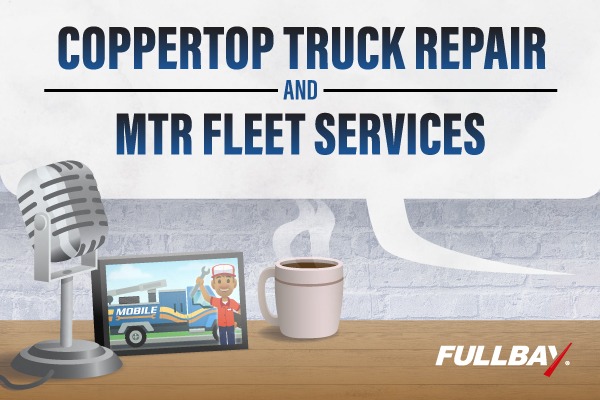Let’s Get Mobile: Lessons Learned From Our Mobile Repair Webinar

You know we love mobile techs here at Fullbay. We write about them, we talk about them…and a few weeks ago, we talked to them.
That’s right: Fullbay co-founder and CEO Jacob Findlay and COO Chris O’Brien had the opportunity to sit down with a couple of our favorites: Kirk Buchak of Coppertop Truck Repair in Alberta, Canada; and Jason Martin of MTR Fleet Services in Georgia. In “Lessons Learned From Running a Mobile Repair Business,” we picked their brains and compiled some great information for those who are interested in starting a mobile branch.
It was an awesome webinar, and Kirk and Jason have some great stories. We encourage you to listen to the whole thing, but if you only have a few minutes, we’ve captured some good advice below!

GETTING STARTED AS A MOBILE TECH
Breakdowns, Chris says, are unfortunately part of life on the supply chain. Tire blowouts, busted turbos – it’s going to happen at some point. This is a vast country, with hundreds of miles of open road between some towns. A driver isn’t always going to be within shouting distance of a repair shop. Thus, technicians need to get to them.
Kirk from Coppertop launched his business with a $2500 service truck. His reasoning was simple: The truck was ultra-low overhead (no rent!), and he liked the truck. “I ran the tires off that thing,” he says. “I wanted to cut it in half and mount it on the wall.”
Jason from MTR Fleet Services took over a dealership’s truck at his last job. “Our customers really enjoyed having a guy come out to them like that,” he said. And he loved being on-site; rather than go back to the dealership between jobs, he would stay out, looking for additional work. He also spent additional time after work writing up all his tickets and ordering his own parts. His job proved unsupportive, and Jason decided to strike out on his own.
Here are some other questions to ask yourself before striking out as a mobile tech:
- Will you operate 24/7? Trucks run at all hours. A willingness to go out at 3 AM can definitely boost revenue, but it has its own challenges.
- Where will you complete the repairs? This will impact how you equip your truck. If you intend to do the bulk of your work on the side of the road, you need to carry a lot more with you. If you plan to tow it into a shop (whether it’s yours or a partner’s) then you can get away with carrying less.
- What repairs will you offer? Kirk, for example, can repair a blown turbo if the truck is in a safe space. Other repairs may require a tow to the shop.
- What’s your bedside manner? Any roadside tech “needs to be able to interact with a customer,” Jason warns. “It takes a special kind of somebody to do that, on top of [getting out to the site and making repairs]. You can’t put a great mechanic with a bad attitude in a truck to go deal with a customer.”
- How will you handle office work? Will you hire an assistant, get software, or some hybrid of the two? Jason points out that he’s taken administrative work off the table for his techs. “That’s not what you’re paying your men to do. You need to manage the business, they need to do the work.”
Here’s a bonus tip: You may want to invest in a good coffee machine. Running a 24/7 shop, Kirk says, requires “a very high caffeine budget.”
CUSTOMER SERVICE IS EVEN MORE CRITICAL
Treating your customers right is critical to almost any service job, but it achieves new importance in this field.
A mobile tech can provide a unique level of customer service you might not find (or need) in a regular shop. You’re dealing primarily with stranded drivers, who may, in some cases, have been stuck out on the road for hours. You aren’t just a repairman to these drivers; you might also be the first human contact they’ve had in a while. Bringing over food or beverages can make a huge difference.
“We’ll give them a ride to a hotel,” Kirk recalls. “I’ve called cabs, brought food. If you go that little bit extra, it pays off in the end – those guys remember you, and when there’s a guy broken down in the truck stop, they’ll say ‘Call this guy.’”
Chris built on this with a story of his own: When he was dispatching for a fleet, the drivers under his care knew the place to have a tire blowout was Casa Grande. There was a tire repair guy who would come out at all hours, bring coffee, and just make a very unpleasant experience a little more bearable.
The drivers talked him up. In other words, word of mouth is key. Good customer service can be its own free advertising.
“Word of mouth is our primary advertisement,” Martin says. “A guy goes from Company A to Company B and they’re using someone else he doesn’t like – he calls us up, and says ‘We need you over here.’”
In short, both of our participants went the extra mile for their customers, and those customers rewarded them.
- Utilize breakdown directories & emergency dispatch. You can get a lot of extra work (and new steady customers) by answering calls for help that come through the big directories.
- Get a decent website going so people can find you. We’ve written all about this before, so if your website looks like it’s from the Dark Ages, do some updating. Make sure you do your SEO correctly, too!
- Be proactive. If Martin spots a customer he’d like to go after, he meets them for lunch or coffee and lays out what MTR has to offer. Even if they don’t hire him on the spot, they’ll have his information in the back of their mind if something does happen.
- Professionally design and wrap your truck. Yes, your truck is a rolling billboard. Kirk painted his oversized bumper bright orange; “It stands out, everyone remembers it.” Uniforms with logos are also a go.
MANAGE YOUR INVENTORY
If your truck is your repair shop, you need it to carry certain items – but you won’t be able to drag your entire parts room with you. Determining inventory will probably take you some time, but once you narrow down what you should have on you at all times, your life will go a lot easier.
Jason keeps inventory lists on all of his trucks. “Every one of our trucks has a minimum of three batteries; two different types of brake chambers; gladhand seals; cold air line kits; pigtails between the trucks…all the common parts. Nuts, bolts, fittings.” They keep those, he adds, because it’s often one nut, or a $5 O-ring holding off a rebuild. “You’ve got to have your truck stocked with the stuff your guys need.”
Kirk brings a similar approach. Coppertop carries common parts, disc brake pots, and even airbags for a particular customer. “In a service truck, if you’re charging a minimum, you want to get in and out while under your minimum.” If you’re constantly going on the hunt for parts (or going back to your physical shop to get them), you’re losing money.
GET ON THOSE PMS
The webinar closed out with a discussion about preventive maintenance and how a mobile tech can turn that into recurring revenue.
Both Jason and Kirk are fans of PMs (as are we!). That’s your projected work schedule,” Jason says. “You can plan [PMs] months out.”
PMs, as we’ve said before, are critical for the customer and the repair shop (and Fullbay is great at tracking them). “If you’re doing your job,” Jason says, “their breakdowns will be at a minimum.” He even ended up scoring a new client because he was handling so many breakdowns for a particular fleet. As his team got in there, he realized their PMs were lacking. Eventually, his team pointed out what was going on and ended up taking over all fleet maintenance work.
HAVE A LISTEN
If you liked what you read, why not give the whole webinar a chance? Kirk and Jason are wonderful storytellers, and the entire hour is filled with good advice for someone who wants to start a mobile repair shop or even just broaden that branch of their business.
And hey, Fullbay has proved very useful for mobile techs and more traditional shop owners. Interested in seeing what it can do for you? Give us a call and we can walk through a demo, free of charge.

